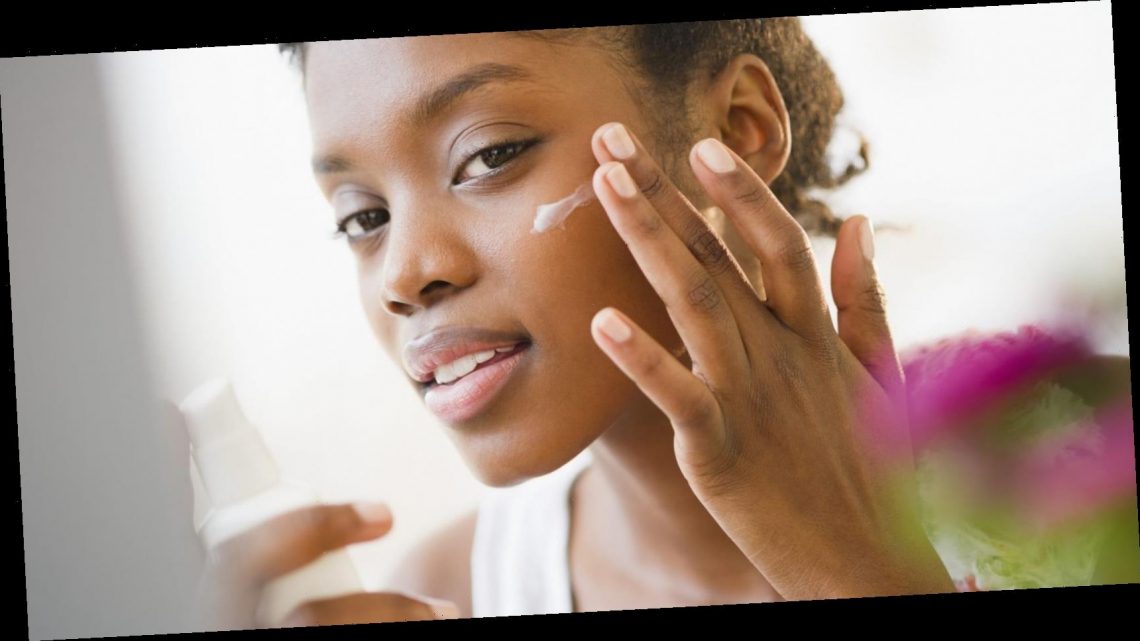
5 lactic acid products that will gently exfoliate your skin
03/25/2021Found yourself going a bit overboard with high-strength skincare acids? Lactic acid is the low-strength, gentle alternative that has incredible benefits, without the sensitivity.
Whether you want a glow, cleaner pores or to reduce redness, you better believe there’s an acid for the job. Glycolic acid is known for its glow-giving benefits, while salicylic acid exfoliates and unclogs pores, and even lesser known acids like antioxidant-rich phytic acid are finding their way into our skincare arsenals.
But, fellow skincare obsessives and novices alike know the excitement of introducing a new acid into your routine. With such instant results,self-restraint quickly goes out the window, and it’s all too tempting to start using it everyday, both morning and night. But no matter how great your skin begins to look, it’s important to remember that acids are strong stuff. There is such a thing as acid overload: use too many acids too often, and you run the risk of weaker, dehydrated and more sensitised skin.
You may also like
These are the proven methods and products to fade acne scars
If you’re after an acid that is much gentler to the skin, then you’ll be pleased to hear that there’s a low-intensity ingredient out there that boasts some pretty incredible skin benefits. But, it’s derived from a more unconventional place than usual. Lactic acid is a substance that’s found in milk. Yes, milk. It’s already in formulations that you already use to maximise the effect of a blend of AHA’s (alpha hydroxy acid), but it’s now known as a pretty trusty exfoliator on its own.
So, we know where it’s from, but how exactly can lactic acid help us in our skincare journey? We spoke to Lisa Kordecki, head therapist at beauty skincare provider, SkinCity to find out more.
You may also like
Phytic acid in skincare: can this wonder ingredient help soothe acne-prone skin?
What is lactic acid?
“Lactic acid belongs to the family of alpha hydroxy acids (AHAs),” says Kordecki. “It’s found in dairy products, and is what gives yogurt and soured milk that distinctive tang.” However, she flags that most of the lactic acid found in skincare products is actually synthetically produced. “Lactic acid is seen by many as the gentler, more tolerated alternative to glycolic acid due to its slightly bigger molecule size.”
What are the benefits of lactic acid?
Typical of an AHA, lactic acid is an exfoliant that speeds up cell turnover as well stimulating cell renewal to help even out skin texture, fade hyperpigmentation and smooth fine lines. “However, lactic acid has an extra benefit you won’t get from its AHA cousins,” adds Kordecki. “It’s a powerful humectant, helping improve the skin’s natural moisture barrier and hydration levels. This makes it ideal for dry or sensitive skin, alongside being a safe and effective ingredient for darker skin types too,” says Kordecki. Those with darker skin can often experience hyperpigmentation that’s more apparent in its darker colour, and so affects the appearance of an even skin tone.
Which skin types and concerns suit lactic acid the best?
Lactic acid works on all skin types, however is particularly beneficial for sensitive, dry and mature skin. “It should be one of the first exfoliating acids people go to if they are more sensitive or cautious about exfoliating. It’s been proven to help hyperpigmentation (aka sun spots or age spots) fade and is safe for use on darker skin without the worry of post-inflammatory hyperpigmentation,” she says.
The exfoliating acid also works effectively on body skin too. “In recent years, it has been proven to help dislodge and remove the keratin plugs from the hair follicles for anyone who has Keratosis Pilaris. Lactic acid helps dissolve the dead cells that build up around the hair follicle, gently smoothing the skin.”
You may also like
Exfoliating acids: how to add AHA’s safely to your skincare routine
How can we use lactic acid in our skincare routine?
For a gentle daily brightening effect, using moisturising creams and serums is best. As lactic acid speeds up cell turnover, it can make skin more vulnerable to UV damage. “Most of these are applied at night rather than during the day, to minimise potential sun damage,” explains Kordecki. “Even so, you’ll still need to use your SPF every morning. If your skin starts getting irritated with daily use, scale back and use these a couple of times per week.”
For stronger exfoliation, try using a mask or at-home peel one or twice a week. “Start off with a low strength and, if your skin responds well, slowly work up to higher strengths if needed. Be careful not to over exfoliate, and that includes other AHAs, BHAs and topical retinoids you might be using, otherwise you’ll over-sensitise your skin,” says Kordecki.
How can we make the most out of lactic acid products?
It’s common knowledge that it takes around 28 days for the skin’s natural exfoliation cycle to finish, a process known as desquamation. While chemical exfoliants like lactic acid will aid the process, it takes time. “The most important thing is to select a lactic acid formulation designed for your skin type, skin condition and preferred routine,” says Kordecki. For example, if you prefer your active ingredient to be in your cleanser rather than a peel and vice versa, stick to that. “Other hydrating ingredients like hyaluronic acid work well with lactic acid, as both have humectant properties to keep your skin hydrated and plump,” she adds.
You may also like
Niacinamide: everything you need to know about this super skin ingredient
Are you a lactic acid convert yet? We’ve rounded up the best products that implement the exfoliating hero as a lead ingredient or in combination with other effective acids.
The best lactic acid skincare
The best lactic acid cleanser: Dermalogica Skin Resurfacing Cleanser
Best skincare products with lactic acid: Dermalogica Skin Resurfacing Cleanser Utilising its smoothing properties, the lactic acid in this cleanser works to retexturise the skin. Fortified with softening vitamin E, it works for all skin types, but may be particularly beneficial for those with mature skin, which tends to be drier.
Shop Dermalogica Skin Resurfacing Cleanser at lookfantastic, £40
buy now
The best lactic acid serum: The Inkey List Lactic Acid
Best skincare products with lactic acid: The Inkey List Lactic Acid A cult brand for good reason, The Inkey Lists’ lactic acid is naturally derived from milk and fruit sugars, all the while being purse-friendly. Not compromising on the formula, it also contains 1% hyaluronic acid to keep skin hydrated.
Shop The Inkey List Lactic Acid at Cult Beauty, £7.99
buy now
The best lactic acid liquid exfoliator: Ren Ready Steady Glow Daily AHA Tonic
Best skincare products with lactic acid: Ren Ready Steady Glow Daily AHA Tonic Ren’s toner combines lactic acid with a lesser-known AHA, willow bark extract, to both soothe and exfoliate skin for a brighter, clearer complexion.
Shop Ren Ready Steady Glow Daily AHA Tonic at lookfantastic, £27
buy now
The best lactic acid treatment: Sunday Riley Good Genes All-in-One Lactic Acid Treatment
Best skincare products with lactic acid: Sunday Riley Good Genes All-in-One Lactic Acid Treatment Lactic acid is combined with a concoction of fruit extracts like prickly pear and licorice to soothe the skin. This treatment is ideal for fatigued, tired and dull skin.
Shop Sunday Riley Good Genes All-in-One Lactic Acid Treatment at Skinstore, £68.85
buy now
The best lactic acid peel: Elemis Peptide4 Overnight Radiance Peel
Best skincare products with lactic acid: Elemis Peptide4 Overnight Radiance Peel Looking the most milk-like out of the products listed, this peel infuses lactic acid with hibiscus flower for more glowing skin overnight. It’s a really gentle formula that sinks into skin well and smells surprisingly sweet.
Shop Elemis Peptide4 Overnight Radiance Peel at lookfantastic, £56
buy now
You may also like
Glycolic acid: why everybody raves about this glow-inducing skincare ingredient
Main image: Getty
Source: Read Full Article

